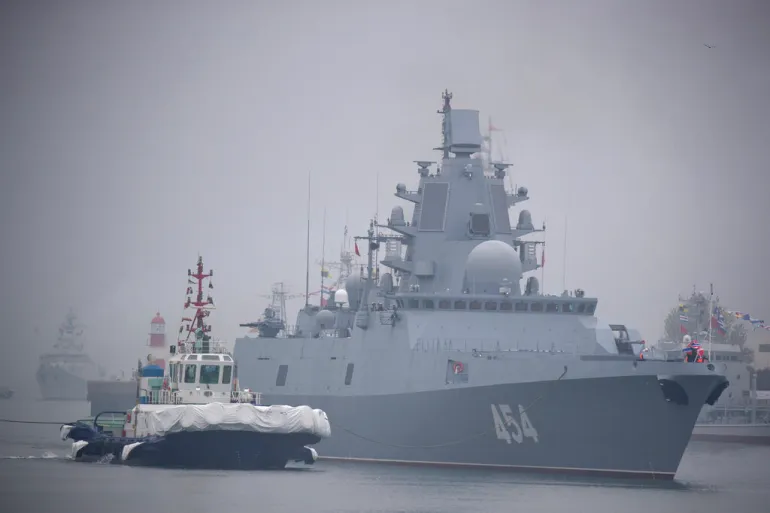
China and Russia have increased military exercises in an alignment of foreign policies and in opposition to the West.
Joint exercises between the Chinese and Russian navy in the East China Sea that begin this week will “further deepen” cooperation between Moscow and Beijing, China has announced.
The drills will be held off the coast of Zhejiang province south of Shanghai from Wednesday until next Tuesday, according to a brief notice posted on Monday by China’s Eastern Theater Command of the People’s Liberation Army.

“This joint exercise is directed at demonstrating the determination and capability of the two sides to jointly respond to maritime security threats … and further deepen the China-Russia comprehensive new-era strategic partnership of coordination,” the notice said.
The Russian defence ministry said on Monday that ships involved in the joint drills included the Varyag missile cruiser, the Marshal Shaposhnikov destroyer, and two corvette-class ships of Russia’s Pacific Fleet.
The ministry said the Chinese navy planned to deploy several surface warships and a submarine for the exercise, and that military aircraft from both sides will take part.
China provided no immediate information on what units would be taking part in the exercise, which comes at a time when ties between Moscow and Beijing – while strained by Russia’s invasion of Ukraine – have remained strong and China has provided political cover for Russia’s war on its neighbour amid international condemnation of Moscow’s aggression.
Russia has also more recently strongly backed China amid its tensions with the US over Taiwan.
Putting aside decades of mutual distrust, China and Russia have stepped up military exercises as part of their aligning of foreign policies in recent years to oppose the US-led liberal Western political order.
As well as refusing to criticise Russia’s invasion of Ukraine, or even to refer to it as an invasion or war, Beijing has condemned Western sanctions against Moscow, and accuses Washington and NATO of provoking Russian President Vladimir Putin into taking action. China also remains a major customer of Russian oil and gas which is being bought at a heavy discount.
Russia and China are also said to be “sharing a toolkit” of approaches and strategies to undermine NATO, according to Julianne Smith, US ambassador to NATO.
“Those two are increasingly sharing a toolkit that should concern the NATO alliance, Smith told the Financial Times in an article published on Tuesday.
“There’s just no question that the [People’s Republic of China] and Russia are both working to divide . . . the transatlantic partners. And we are now very aware, we all have a deeper appreciation of those efforts and are intent on addressing them,” Smith said in an interview.
“We’ve seen them share hybrid tactics,” Smith added. “I think China watches very closely how Russia relies on disinformation and things like coercion or energy security, malign or malicious cyber-operations,” she said.
NATO listed China for the first time in June as one of its strategic challenges, saying Beijing’s ambitions and its “coercive policies” undermined the Western military bloc’s “interests, security and values”.
In November, Tu-95 bombers of the Russian air force and Chinese H-6K bombers flew joint patrols over the Sea of Japan and the East China Sea. As part of the drills, the Russian bombers landed in China for the first time, and the Chinese bombers flew to an air base in Russia.
In September, China sent more than 2,000 troops along with more than 300 military vehicles, 21 combat aircraft and three warships to take part in a sweeping joint exercise with Russia.
The Vostok 2022 (East 2022) exercise took place in various locations in Russia’s Far East and the Sea of Japan and involved more than 50,000 troops and 5,000 weapons units, including 140 aircraft and 60 warships, according to the Russian defence ministry.
China last week also sent a squadron of navy ships through straits near Japan into the Western Pacific as Beijing blasted Tokyo’s adoption of a new national security strategy putting itself on a more offensive footing — largely as a result of the perceived threat from China.
SOURCE: AL JAZEERA AND NEWS AGENCIES








